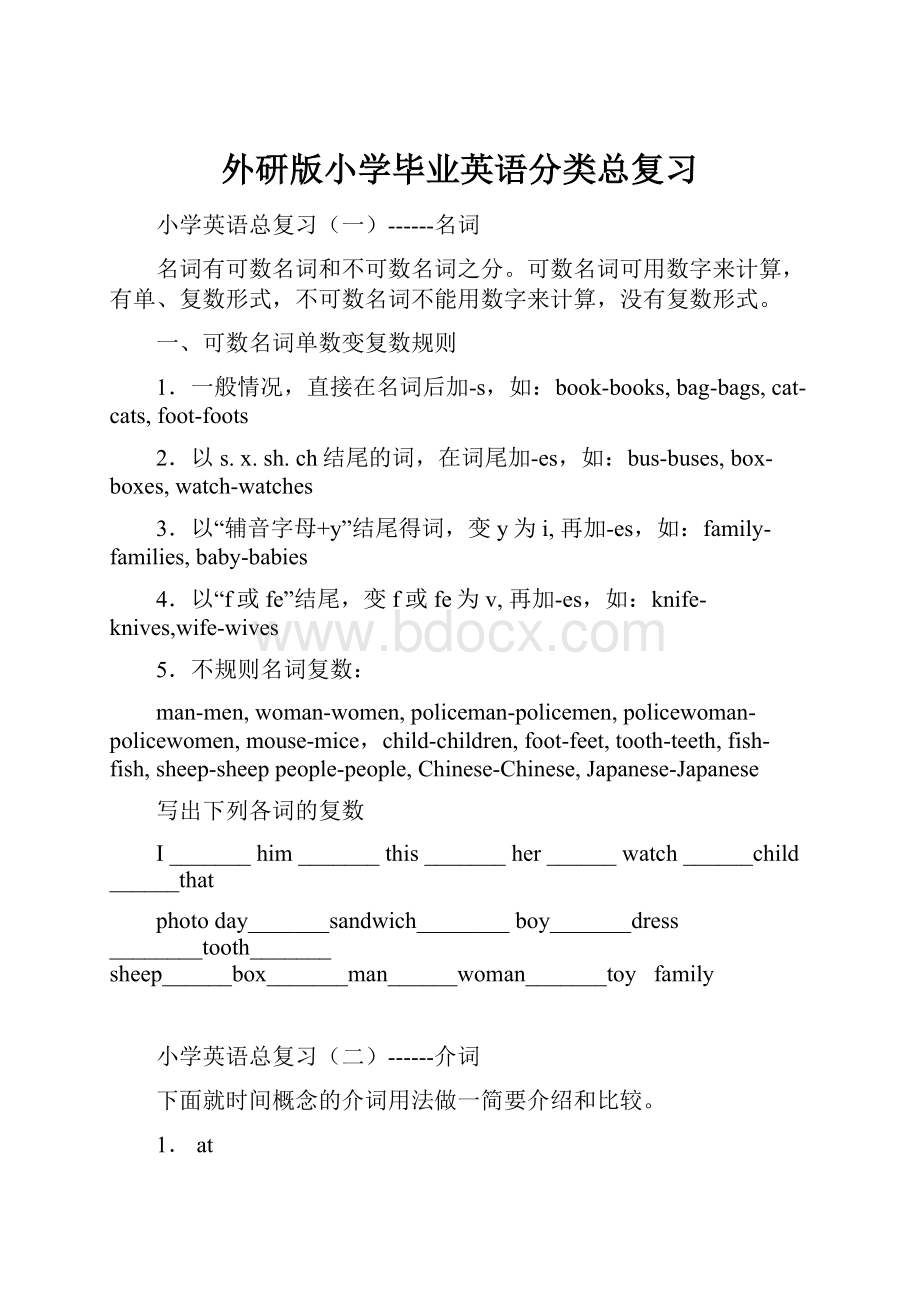外研版小学毕业英语分类总复习.docx
《外研版小学毕业英语分类总复习.docx》由会员分享,可在线阅读,更多相关《外研版小学毕业英语分类总复习.docx(23页珍藏版)》请在冰豆网上搜索。

外研版小学毕业英语分类总复习
小学英语总复习
(一)------名词
名词有可数名词和不可数名词之分。
可数名词可用数字来计算,有单、复数形式,不可数名词不能用数字来计算,没有复数形式。
一、可数名词单数变复数规则
1.一般情况,直接在名词后加-s,如:
book-books,bag-bags,cat-cats,foot-foots
2.以s.x.sh.ch结尾的词,在词尾加-es,如:
bus-buses,box-boxes,watch-watches
3.以“辅音字母+y”结尾得词,变y为i,再加-es,如:
family-families,baby-babies
4.以“f或fe”结尾,变f或fe为v,再加-es,如:
knife-knives,wife-wives
5.不规则名词复数:
man-men,woman-women,policeman-policemen,policewoman-policewomen,mouse-mice,child-children,foot-feet,tooth-teeth,fish-fish,sheep-sheeppeople-people,Chinese-Chinese,Japanese-Japanese
写出下列各词的复数
I_______him_______this_______her______watch______child______that
photoday_______sandwich________boy_______dress________tooth_______sheep______box_______man______woman_______toyfamily
小学英语总复习
(二)------介词
下面就时间概念的介词用法做一简要介绍和比较。
1.at
(1)表示时间概念的某一个点。
(在具体的某一时刻和时段等)。
atnightat6:
00
(2)表示在某一具体地点(小地点)。
如atthebusstop,athome
2.on
(1)在······上面(表面接触;长在上面)。
如onthechair,onthetree
(2)在某天的上午、下午或晚上。
如:
onMonday,onTuedaymoring
3.in
(1)在······里面。
如:
inthebox
(2)在一段时间里。
如:
inthemoring
(3)在某一年份、季节、月份。
如:
in2014,inOctober,insummer
(4)在······上(外来)如:
Thereisacatinthetree.
4.after
(1)在······之后(时间)。
如:
Ioftenplayfootballschool.
(2)在······后面(位置)。
如:
Icanrunafteryou.
口诀(时间介词)
年月周前要用in,日子前面却不行。
遇到几号要用on,上午下午又是in。
要说某日上下午,用on换in才能行。
午夜黄昏须用at,黎明用它也不错。
at也用在时分前,说“差”可要用上to,
说“过”只可使用past,多说多练牢牢记,
莫让岁月空蹉跎。
口诀(方位介词)
in在······里,out在······外,在旁边的是beside,靠近的为by,on在······上,under在·······下,over在······上头,below在底下。
词语练习
一、介词填空
1、_______theschoolplayground2、_________Wednesday
3、alot_______fruittrees4、live_________atown
5、look______them7、________NewYear6、_________ChristmasDay
小学英语总复习(三)------代词
一、人称代词和物主代词
1、人称代词有主格和宾格的区别:
主格通常位于句中第一个动词之前,宾格一般位于动词或介词之后。
2、物主代词有形容词性与名词性的区别:
形容词性用时后面一般要带上词,名词性则单独使用,后面不带名词。
人称代词
物主代词
主格
宾格
形容词性
名词性
我
I
me
我的
my
mine
你,你们
you
you
你的,你们的
your
yours
他
he
him
他的
his
his
她
she
her
她的
her
hers
它
it
it
它的
its
its
我们
we
us
我们的
our
ours
他(她,它)们
they
them
他(她,它)们的
their
theirs
二、指示代词
共有四个:
this,that,these,those。
this和that用于指代单数,these和those用于指代复数。
三、疑问代词
一般用来构成特殊疑问句,常见的疑问代词有who(谁),when什么时候),where(哪里),what(什么),how(怎样),which(哪一个)等等。
练习
1.填写代词表
主格
I
it
we
宾格
you
them
形容词性物主代词
his
your
名词性物主代词
hers
二.用所给词的适当形式填空
1. Thatisnot_________kite.Thatkiteisverysmall,but_________isverybig. (I)
2. Thedressis_________.Giveitto_________.(she)
3. Isthis_________watch?
(you)No,it’snot_________.(I)
4. _________ismybrother._________nameisJack.Look!
Thosestampsare_________.(he)
5. _________dressesarered.(we)Whatcolourare_________?
(you)
6. Herearemanydolls,whichoneis_________?
(she)
7. Ihaveabeautifulcat._________nameisMimi.Thesecakesare_________.(it)
10. Arethese_________tickets?
No,_________arenot_________._________aren’there.(they)
12. Ihavealovelybrother._________isonly3.Ilike_________verymuch.(he)
13. _________ismyaunt.Doyouknow_________job?
_________anurse.(she)
14. Somanydogs.Let’scount_________.(they)
三、用am,is,are填空
1.I______aboy. ______youaboy?
No,I_____not.2.Thegirl______Jack'ssister.
3.Thedog_______tallandfat.4.Themanwithbigeyes_______ateacher.
5.You,heandI______fromChina.6.Where_____yourmother?
She______athome.
7.MikeandLiuTao______atschool.8.Whosedress______this?
9.Whosesocks______ they?
10.That______myredskirt.
小学英语总复习(四)------形容词
形容词比较级和最高级变化规则:
构成
原级
比较级
最高级
单音节和少数双音节单词
一般词尾加-er,-est
tall
long
old
small
taller
longer
older
smaller
tallest
longest
oldest
smallest
以字母e结尾的形容词或副词,直接加-r,-st
nice
fine
large
nicer
finer
larger
nicest
finest
largest
以重读闭音节结尾的形容词或副词,如末尾只有一个辅音字母,双写该字母,再加-er,-est
big
hot
fat
thin
bigger
hotter
fatter
thinner
biggest
hottest
fattest
thinnest
以“辅音字母+y”结尾的形容词或副词,把y变为i,再加-er,-est
heavy
busy
early
easy
heavier
busier
earlier
easier
heaviest
busiest
earliest
easiest
不规则变化的形容词:
little/few(原形)- less(比较级)-least(最高级)
good(原形)-better(比较级)-best(最高级)
bad(原形)-worse(比较级)-worst(最高级
小学英语总复习(五)------一般现在时
(一)一般现在时的基本用法;
1.表示经常的或习惯性的动作,常与表示频率的时间状语连用,(alway,usually,sometime,never,everyday,everyweek,······
如:
Igetupatsixeveryday.我每天六点起床。
2.表示客观现实和普遍的真理。
如:
Theearthmovesaroundthesun.地球绕着太阳转。
3.表示主语的特征、能力、职业、性格。
如:
Theskyisblue.天空是蓝色的。
Mymotherisateacher.我妈妈是位老师。
(二)一般现在时的构成:
1.be动词:
①肯定句:
主语+be(am,is,are)+其它。
如:
Iamaboy.我是一个男孩。
②否定句:
主语+be+not+其它。
如:
Heisnotaworker.他不是工人。
③一般疑问句:
Be+主语+其它。
如:
-Areyouastudent?
-Yes.Iam./No,I'mnot.
2.行为动词:
①肯定句:
主语+行为动词(+其它)。
如:
WestudyEnglish.我们学习英语。
(当主语为第三人称单数(he,she,it)时,要在动词后加"-s"或"-es"。
如:
MarylikesChinese.玛丽喜欢汉语)
②否定句:
主语+don't(doesn't)+动词原形(+其它)。
如:
Idon'tlikebread.
(当主语为第三人称单数时,要用doesn't构成否定句。
如:
Hedoesn'toftenplay.) ③一般疑问句:
Do(Does)+主语+动词原形+其它。
如:
-Doyouoftenplayfootball?
-Yes,Ido./No,Idon't.。
(三)一般现在时动词第三人称单数形式变化规则:
1.一般情况下,直接加-s,如:
look-looks,play--plays
2.以s.x.sh.ch.o结尾,加-es,如:
wash-washes,watch-watches,go-goes
3.以“辅音字母+y”结尾,变y为i,再加-es,如:
study-studies,fly--flies
另外,还有一些特殊情况,需熟记。
如:
have—has
一般现在时用法练习:
一、写出下列动词的第三人称单数
drink______go_______stay________make________look________have_______pass_______ carry___come________ watch______
fly________study_______do_________ teach_______have
二、用括号内动词的适当形式填空。
1.Heoften________(have)dinnerathome.
2.DanielandTommy_______(be)inClassOne.
3.We_______(notwatch)TVonMonday.
4.Nick_______(notgo)tothezooonSunday.
6.What_______theyoften_______(do)onSaturdays?
7.She_______(go)toschoolfromMondaytoFriday.
8.Thegirl_______(teach)usEnglishonSundays.
9.SheandI________(take)awalktogethereveryevening.
10.There________(be)somewaterinthebottle.
11.Mike_______(like)cooking.
12.They_______(have)thesamehobby.
13.Myaunt_______(look)afterherbabycarefully.
14.Youalways_______(do)yourhomeworkwell.
15. Whatday_______(be)ittoday?
-It’sSaturday.
16.18.Thechildoften_______(watch)TVintheevening.
小学英语总复习(六)------现在进行时
现在进行时
现在进行时表示现在正在进行或发生的动作,也可表示当前一段时间内的活动或现阶段正在进行的动作。
现在进行时由be+动词ing构成
①肯定句基本结构:
主语+be+动词ing.如:
IamwatchingTV.
②否定句基本结构:
主语+benot+动词ing.如:
IamnotwatchingTV.
③一般疑问句基本结构:
be动词+主语+动词ing?
如:
AreyouwatchingTV?
Yes,Iam./No,Iamnot.
④特殊疑问句基本结构:
疑问词+be+主语+动词ing?
如:
Whatareyoudoing?
但疑问词当主语时,其结构为:
疑问词+be+动词ing?
如:
WhoiswatchingTV?
动词加ing(动词现在分词)的变化规则
动词现在分词构成:
动词原形+ing,规则如下:
①一般情况下直接加ing
think---thinkingsleep---sleepingsend---sendingspeak---speaking
②以不发音的字母e结尾的单词,去掉字母e,再加ing
come---comingmake---makingleave---leavinghave---havingtake---taking
③以重读闭音节(重读闭音节即两个辅音中间夹一个元音并且重读的音节)结尾,先双写末尾的辅音字母,再加ing
stop---stoppingsit---sittingrun---runningskip---skipping
这类词还有:
get,run,set,sit,stop,swim,drop等。
现在进行时专项练习:
一、写出下列动词的现在分词:
play________run__________swim_________make__________stop_________
go________like________ write________read________have_________shop______sing ________dance_________put_________see________buy_________love____________live_______take_________come________ get_________
二、用所给的动词的正确形式填空:
1.Theboy__________________(draw)apicturenow.
2.Listen.Somegirls_______________(sing)intheclassroom.
3.Mymother_________________(cook)somenicefood now.
4.What_____you______(do)now?
5.Look.They_______________(have)anEnglishlesson.
6..______Helen____________(wash)clothes?
Yes,sheis.
7.Look!
thegirls________________(dance)intheclassroom.
8.Whatisourgrandmadoing?
She_________(listen)tomusic.
三、句型转换:
1.Theyaredoinghousework.(改成否定句和一般疑问句)
_____________________________________________________________
_____________________________________________________________
2.Thestudentsarecleaningtheclassroom.(改一般疑问句并作肯定和否定回答)
_________________________________________________________________
_________________________________________________________________
3.I’mplayingthefootballintheplayground.(对划线部分进行提问)
_________________________________________________________________
4.Tomisreadingbooks.(对划线部分进行提问)
________________________________________________________________
小学英语总复习(七)------一般将来时
一般将来时
表示将来某个时间要发生的动作或存在的状态,也可以表示打算、计划或准备做某事。
常与一般将来时连用的时间状语有:
tomorrow,nextday(week,month,year…),soon,thedayaftertomorrow(后天)等。
一般将来时的用法和结构;
⑴肯定句:
①主语+will+动词原形+其它.
如:
Iwillgototheparktomorrow.
②主语+begoingto+动词原形+其它
如:
Iamgoingtogototheparktomorrow.
begoingto=will
Iwillgototheparktomorrow.=Iamgoingtogototheparktomorrow.
⑵否定句:
在be动词(am,is,are)后加not,情态动词will后加not(willnot=won’t)。
例如:
Iwillhaveapicnicthisafternoon.→Iwon’tgoingtohaveapicnicthisafternoon.
⑶一般疑问句:
把be或will提到句首,some改为any,and改为or,第一二人称互换。
Iwillgototheparktomorrow.-----Willyougototheparktomorrow?
4特殊疑问句
1、问人疑问词为(Who)
例如:
I’mgoingtoNewYorksoon.→Who’sgoingtoNewYorksoon.
2. 问某人要去干什么疑问词为(What).
例如:
MyfatherisgoingtowatchTVthis afternoon.→Whatisyourfathergoingtodothisafternoon?
3. 问某人去哪里疑问词为(where)
He’sgoingtohaveapicnicinthepark.
------Whereishegoingtohaveapicnic?
4.问某人什么时候去疑问词为(when)
例如:
She’sgoingtogotobedatnine.→Whenisshegoing tobed?
将来时练习:
一、填空
1. 我打算明天和朋友去野炊。
I_____________________haveapicnicwithmyfriends.
I________haveapicnicwithmyfriends.
2. 下个星期一你打算去干嘛?
我想去打篮球。
What_____